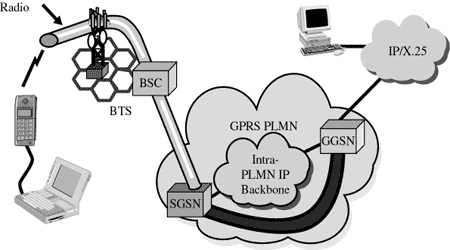
GPRS - PDP Context
PDP stands for Packet Data Protocol. The PDP addresses are network layer addresses (Open Standards Interconnect [OSI] model Layer 3). GPRS systems support both X.25 and IP network layer protocols. Therefore, PDP addresses can be X.25, IP, or both.
Each PDP address is anchored at a Gateway GPRS Support Node (GGSN), as shown in figure below. All packet data traffic sent from the public packet data network for the PDP address goes through the gateway (GGSN).

The public packet data network is only concerned that the address belongs to a specific GGSN. The GGSN hides the mobility of the station from the rest of the packet data network and from computers connected to the public packet data network.
Statically assigned PDP addresses are usually anchored at a GGSN in the subscriber's home network. Conversely, dynamically assigned PDP addresses can be anchored either in the subscriber's home network or the network that the user is visiting.
When a MS is already attached to a SGSN and it is about to transfer data, it must activate a PDP address. Activating a PDP address establishes an association between the current SGSN of mobile device and the GGSN that anchors the PDP address.
The record kept by the SGSN and the GGSN regarding this association is called the PDP context.
It is important to understand the difference between a MS attaching to a SGSN and a MS activating a PDP address. A single MS attaches to only one SGSN, however, it may have multiple PDP addresses that are all active at the same time.
Each of the addresses may be anchored to a different GGSN. If packets arrive from the public packet data network at a GGSN for a specific PDP address and the GGSN does not have an active PDP context corresponding to that address, it may simply discard the packets. Conversely, the GGSN may attempt to activate a PDP context with a MS if the address is statically assigned to a particular mobile device.